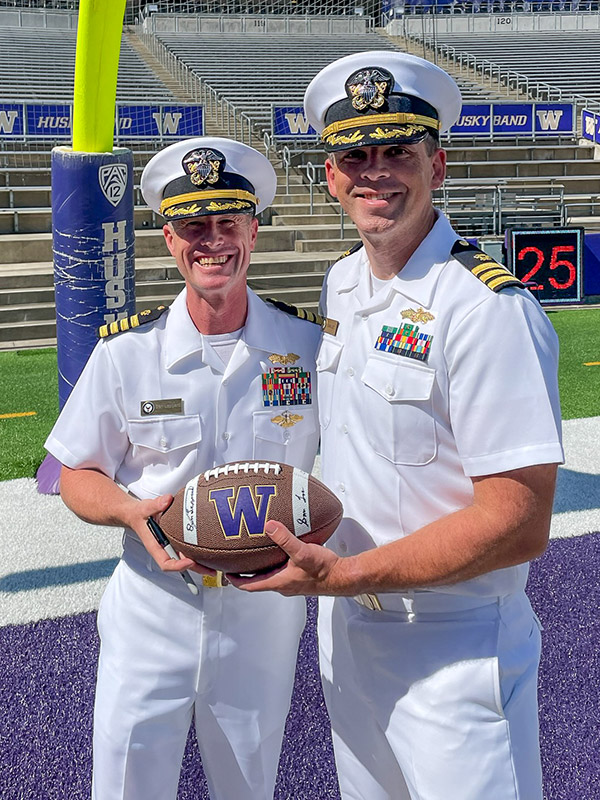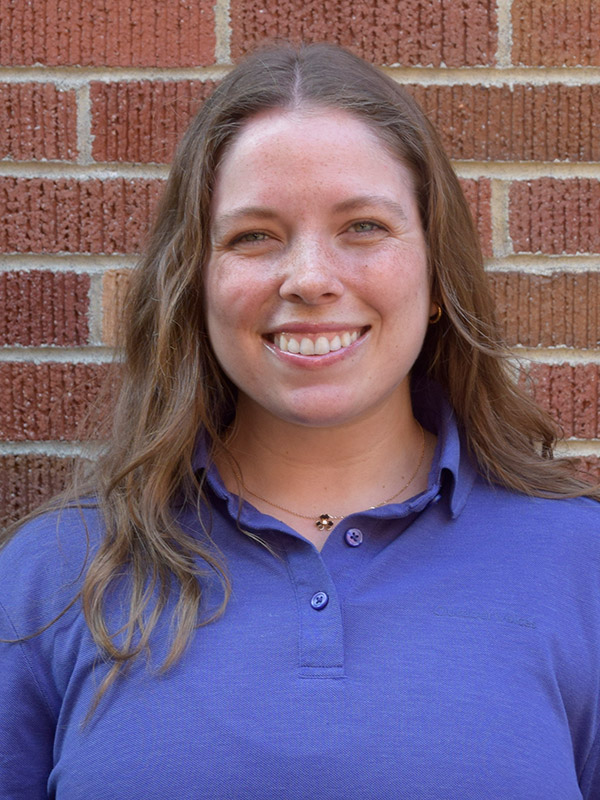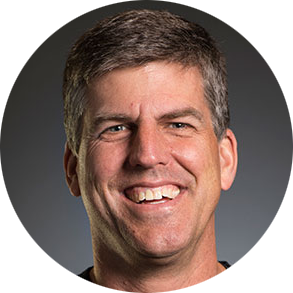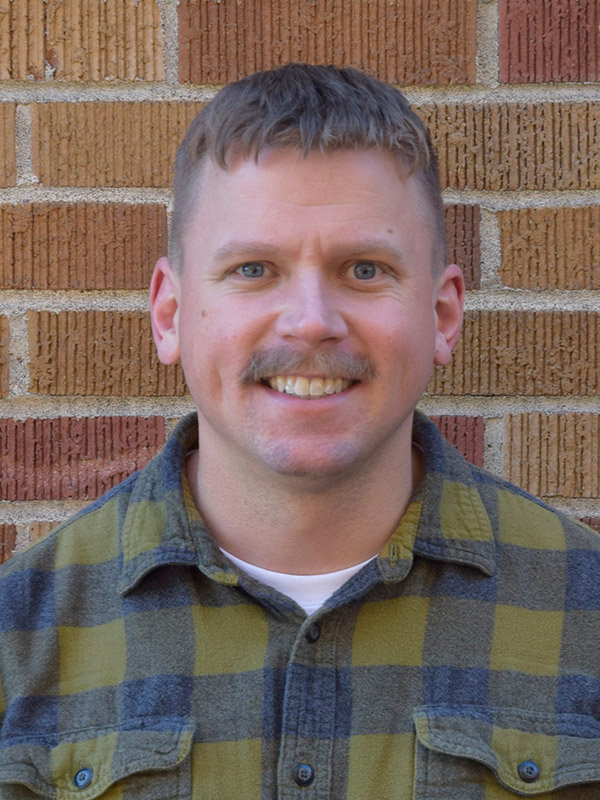By Julia Davis
In CEE, military officers have found a home for both their academic pursuits while enriching the departmental community with their unique perspectives.

Sam Lee (right, MSCE ‘19) was promoted to the rank of Commander at a ceremony held in the end zone at Alaska Airlines Field at Husky Stadium on September 1, 2023. Lee’s promoting officer was Captain Benjamin Leppard (left, MSCE ‘07). Both are alums of CEE’s graduate program.
Every year, more than 100 students begin their graduate studies in the CEE department. For a select few, starting this academic journey marks the first time in years that they’ve experienced the normalcy of life outside of the military. While they come to the UW to pursue graduate degrees to advance their military careers, they also enhance the CEE community with their unique perspectives, dedication and leadership skills.

Sam Lee (right, MSCE ‘19) was promoted to the rank of Commander at a ceremony held in the end zone at Alaska Airlines Field at Husky Stadium on September 1, 2023. Lee’s promoting officer was Capt. Benjamin Leppard (left, MSCE ‘07). Both are alums of CEE’s graduate program.
Sam Lee (MSCE ‘19), a Commander in the U.S. Navy Civil Engineering Corps, even chose to have his recent promotion ceremony at Husky Stadium after his experience attending UW for his master’s degree.
In the military, civil engineers play essential roles in constructing, maintaining and managing the infrastructure that supports military operations. Their responsibilities range from facilities management on military bases to active construction projects where they are building infrastructure in challenging environments, often from the ground up.
The military sends some engineers to civilian schools because of the specialization that is required at higher levels of the profession. These students come to the department from all branches of the military, and most have already been working in the area of civil and environmental engineering in a military capacity.
"The graduate education opportunities that the Navy offers, like through the Navy Postgraduate School, don't really focus on the technical skills and sub-specialties that we require in the civil engineering trade,” says Trey Sweet, a Lieutenant in the U.S. Navy Civil Engineering Corps who began his master’s degree this fall.

U.S. Air Force First Lieutenant Ashlyn Aldridge
Ashlyn Aldridge, a First Lieutenant in the U.S. Air Force, also joined the department this fall. She emphasizes the importance of the military staying current with civilian engineering practices as one of the driving factors for pursuing an advanced degree.
"The main reason the Air Force sends us to civilian schools is to gain expertise in a specific field to apply to the military once we return,” she says. “Our civil engineers take a broad approach to problem solving, which leads us to rely on subject matter experts, so by receiving a graduate education, we become much more valuable to the force.”
The differences between military and civilian life also extend outside the classroom. Transitioning from a military career to being a student is “a complete 180-degree shift” says Aldridge.
“One of the hardest things to adapt to has just been choosing what to wear every day, because that’s something I have not had to think about in years,” she says.
Leading by example
Because they come from a very different life than many of their fellow students, military members bring a wealth of experience and a unique perspective to the department. Steve Muench, the associate chair for education and a veteran himself, emphasizes how “when we see applications from military officers, we know they're going to be good. We know they're going to be focused. We know they can problem solve and take care of themselves."
He also sees the effect they have on their fellow students in the department with their strong work ethic, discipline and leadership skills.

“When we see applications from military officers, we know they're going to be good. We know they're going to be focused. We know they can problem solve and take care of themselves.”
“I love having them in my class because they will lead a group but do it by bringing everybody else along and helping other people out and making them better,” Muench says.
CEE has a reputation in many branches of the military. Sweet heard many of his fellow officers talk about their experiences earning their degrees in the department.
“I know a lot of cohorts that have come through the [UW], and there are at least a few Navy Civil Engineering Corps officers going here at any given time,” he said. “So there's a lofty reputation amongst my peers for how the experience was at the UW pursuing their respective degrees.”
Tailoring education to military needs
The flexibility of the CEE master’s degrees is a big draw for military officers because students can shape their degrees and choose classes that they know they will use. In the military, this is particularly helpful for officers who will be doing projects in many different realms of civil engineering.
“[The department] has really built a program that is well-aligned with what we do and designed for military officers maintaining the bases,” Lee says.

U.S. Navy Lieutenant Trey Sweet
The Construction, Energy, and Sustainable Infrastructure (CESI) master’s program is particularly attractive to these military students, as it allows them to explore various aspects of the field.
“Some other programs study a lot of areas that are very specific, but as military engineers, we're more generalists, and the CESI program allows us to study a lot of different things,” Lee says.
One aspect of the master's level construction courses that stands out to many students coming from the military is the intersection of sustainability and climate change, which is somewhat atypical for programs that are focused on construction.
“I’m taking an energy infrastructure course right now that has climate change as a key focus area, and that is definitely of interest to the Navy because, for the most part, Navy bases are located on coastlines,” Sweet says. “So if the seas and the oceans are rising, that is an inherent risk to our mission. Part of my role as an installation public works department leader will be looking at, ‘how do we combat this?’”
Academics to active duty
The knowledge and skills gained from their time in the department will be put to use as soon as they return to full-time active duty.
I use what I learned at the UW every day in the jobs that I've been doing. Some of it is technical skills, some of it is the ability to better analyze and work through complex problems, and some is the communications skills that I need to work with people from all different sectors.”
“I use what I learned at the UW every day in the jobs that I've been doing. Some of it is technical skills, some of it is the ability to better analyze and work through complex problems, and some is the communications skills that I need to work with people from all different sectors,” says Lee, who has continued to thrive in his naval career since finishing his degree four years ago.
Ashlyn Aldridge is doing her thesis research on carbon emissions from airfield paving projects, and hopes to use that knowledge in a new way when she returns to the Air Force.
“My goal is to go to the rapidly deployable heavy construction team and take the technical expertise that I've gained in my master’s degree and apply that to heavy construction in the military,” she says.
The transition from active duty to academia offers a shift in focus for military officers. Muench recognizes this distinction and sees the graduate program as an opportunity for them to channel their energies into mastering new areas that are crucial to the evolving needs of the military.
"We're not going to teach them leadership or management skills, they know that already,” Muench says. “But oftentimes in the military, they’re so busy in the day-to-day work; it's nice to have this year where they can just focus on something that they want to learn a lot about. Whether that be sustainable infrastructure or renewable energy or heavy construction, to be given the time to focus on it is invaluable.”
Originally published November 6, 2023